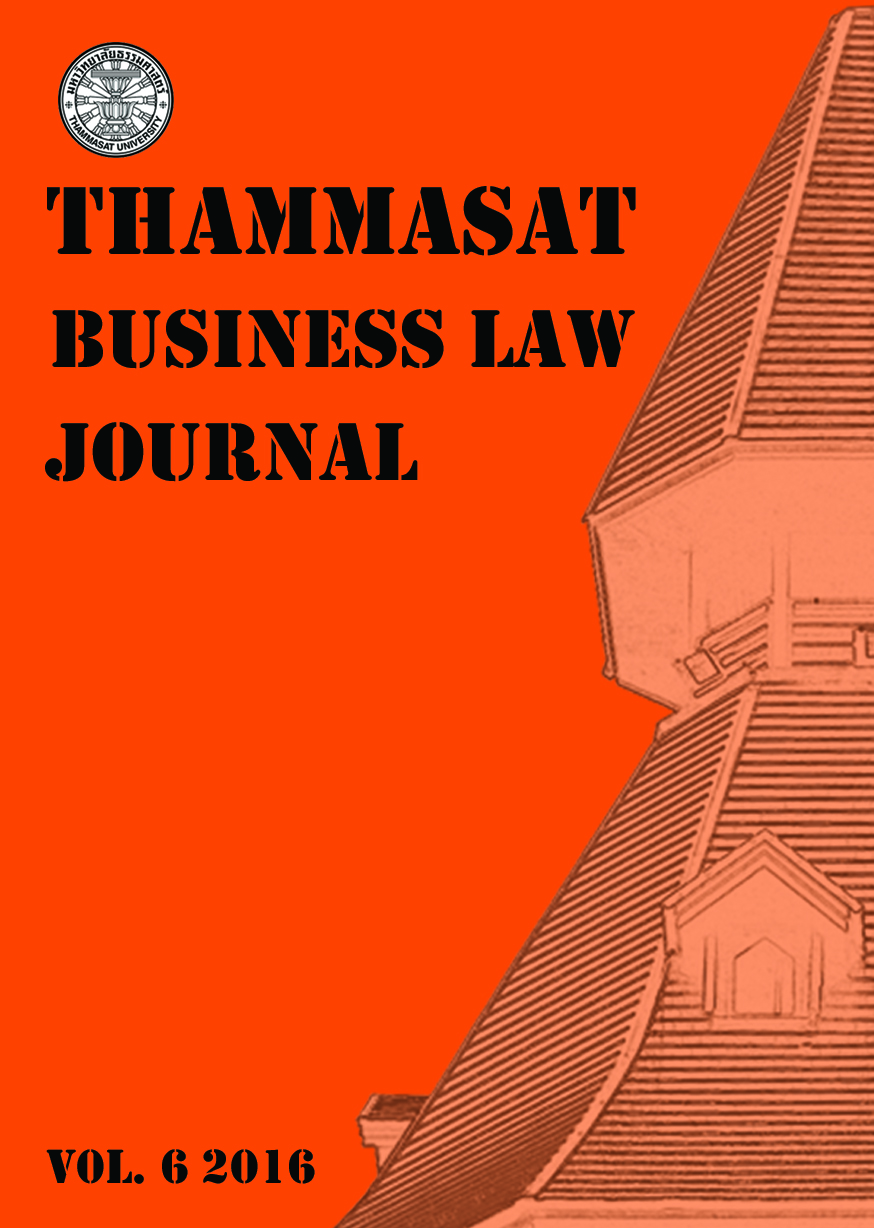INTERNET ADVERTISING CLICK FRAUD
Main Article Content
Abstract
There are many categories of internet advertising nowadays, one that has legal issues is “search engine marketing” which is a source of Click Fraud. Since Thailand has just begun using internet advertising, it still has gaps of laws for this legal issues. Therefore, it is necessary to study laws from other developed countries in order to understand and realize what Thai laws should be amended.
Search engine marketing has a special payment method for the business operators or advertisers, called “Pay-Per-Click”, which an advertiser will be charged whenever there is a click on its internet advertisement and the advertiser has to pay to an advertising agency or an advertisement publisher. A person who makes Click Fraud in this payment method with knowledge creating a fraud click to the displaying internet advertisement. There are two main categories of Click Fraud; the publisher click fraud which made by the advertising publisher or the advertising agency, and the competitor click fraud which made by the competitive business operator. The consequence of the above mentioned Click Fraud is a new type of cybercrime which has become known to the potential victim advertiser with huge damages and harm left to the internet advertising business.
This article presents the study about laws of developed countries like the United States of America, China, and Japan, which has faced to this cybercrime for many years. They provide their own domestic laws in order to govern the Click Fraud issue. However, although there are many laws relating to cybercrimes protection, there are still gaps of law which cannot apply to Click Fraud issue. Therefore, this article will present analysis of how Thai laws could not govern to Click Fraud and the recommendation of solution in order to make Thai laws effective and enforceable.
Article Details
References
ศักดา ธนิตกุล. คำอธิบายว่าด้วยกฎหมายแข่งขันทางการค้า พ.ศ. 2542. พิมพ์ครั้งที่ 8. กรุงเทพฯ:วิญญูชน, 2551 (Sakda Thanitkul. Competition Act B.E. 2542 Explanation and Case Study. 8th ed.Vinyuchon Publishing, 2551).
จิตติ ติงศภัทิย์. คำอธิบายประมวลกฎหมายแพ่งและพาณิชย์ เรียงมาตรา ว่าด้วย จัดการงานนอกสั่ง ลาภมิควรได้ ละเมิด. กองทุนศาสตราจารย์จิตติ ติงศภัทิย์. คณะนิติศาสตร์ มหาวิทยาลัยธรรมศาสตร์, 2557. (Jitti Tingsapat. Civil and Commercial Code Explanation: Management of Affairs Without Mandate, Undue Enrichment, and Wrongful Acts. Jitti Tingsapat Foundation Faculty of Law, Thammasat University, 2557).
Nicolas Christin, Sally S. Yanagihara, and Keisuke Kamataki. Dissecting One Click Frauds. Carnegie Mellon University Technical Report CMU-CyLab-10-011, 2010.
Amy Tracy. Technology Law - Great Google-y Moogley: The Effect and Enforcement of Click Fraud and Online Advertising, 32 U. Ark. Little Rock L. Rev. 347, http://lawrepository.ualr.edu/lawreview/vol32/iss3/5, 2010.
Chen Jia. Click Fraud and Exploration of Its Prosecution in China, http://wenku.baidu.com/view /f91d5023bcd126fff7050b96.html.
Ronald L. Johnston, Arnold & Protor. The Computer & Internet Lawyer, http://thejordanlawgroup.com/OLDSITE/media/computerinternetlawyer mag.pdf., 2010.


